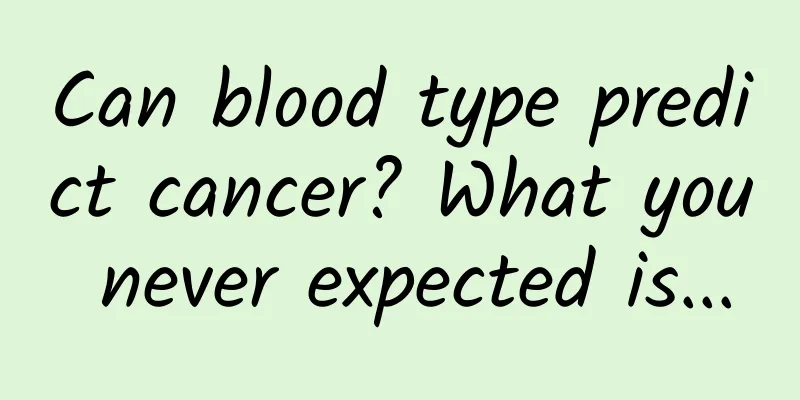Can blood type predict cancer? What you never expected is...

|
Expert of this article: Song Yingwei, Chief Technician of Transfusion Medicine Department, First Medical Center, PLA General Hospital This article was reviewed by Wang Deqing, chief physician and doctoral supervisor of the Department of Transfusion Medicine, First Medical Center, PLA General Hospital We often see this kind of plot in TV dramas: someone suffers from severe bleeding due to a car accident or trauma, and the hospital does not have enough blood in stock or cannot find a matching blood source, so the immediate family members (parents, children) rush to donate blood for them... Copyright image, no permission to reprint However, is it really reliable to donate blood between immediate family members? June 14th of each year is World Blood Donor Day, so let's learn more about blood today~ 1 Is it possible to transfuse blood between relatives? You should know that during the blood transfusion process, the blood recipient not only needs to bear the risk of contracting diseases, but also needs to prevent various adverse reactions during the transfusion process. Transfusion associated graft-versus-host disease (TA-GVHD) is one of the adverse reactions to transfusion and is also one of the most serious complications of transfusion. Because the process of allogeneic blood transfusion is essentially a process of transplanting foreign objects, that is, transplanting allogeneic cells into the host body to exert their effects, the transplantation will inevitably be accompanied by a series of immune reactions, and TA-GVHD is a type of complication with a very high mortality rate. According to domestic and foreign reports, once TA-GVHD occurs during blood transfusion, there is no specific treatment method and the mortality rate of the recipient is over 90%. Copyright image, no permission to reprint The pathogenesis of TA-GVHD is mediated by lymphocytes in the blood, which migrate and proliferate in the patient's body, and then attack and destroy the patient's body's severe immune response. Simply put, it is a serious adverse reaction caused by the lymphocytes in the blood of the recipient becoming the host, proliferating massively, and frantically attacking the cells and tissues in the recipient's body. Is this TA-GVHD related to blood transfusions between relatives? The relationship is very close! The incidence of TA-GVHD, a transfusion complication, among relatives is much higher than that among non-relatives, especially among first-degree relatives, that is, parents and children, where the incidence is 11-21 times higher. Therefore, in order to avoid complications, blood transfusions between relatives must be avoided to the greatest extent possible. However, with the continuous development of medical technology, special medical equipment is now available that can kill lymphocytes in blood (blood irradiation), and the treated blood can be safely transfused to one's immediate family members. 2 Can blood type be tested using saliva? Yes, a proper amount of saliva combined with certain experiments can produce blood type results. As early as the early 1930s, foreign scientists discovered that most people's saliva and other secretions contain a substance called ABH that is identical to their own red blood cell ABO blood type antigens. Through certain tests, it has been used in the field of forensic medicine as one of the indicators for personal identification and paternity determination, but is rarely used in clinical and daily blood type analysis. With the advancement of science and technology and the development of medicine, blood type testing through saliva can now be easily achieved through genetic testing: the prosecutor extracts oral cells shed from the saliva through a certain method, amplifies their genetic information, and then uses specific equipment to analyze and determine the DNA molecular information in the subject's cells to obtain the subject's blood type. 3 Isn’t O-type blood what mosquitoes prefer? The Shanghai Insect Museum of the Chinese Academy of Sciences has conducted experiments specifically on this: The Chinese Academy of Sciences selected 60 volunteers for this experiment. Before the experiment, each volunteer's blood type was tested, and then the volunteers cleaned their hands with clean water to ensure that their hands were free of sweat and odor. During the experiment, the volunteers wore pink plastic gloves and opened a 4-cm opening on the back of each glove. The volunteers put their left and right hands into the mosquito cage twice, and the staff recorded the number of Aedes albopictus (commonly known as flower-legged mosquitoes) that stayed on the back of the volunteers' hands within 40 seconds of the experiment. The results showed that in an environment with a temperature of 26℃-28℃ and a humidity of 60%, the number of times that Aedes albopictus stayed on the back of the volunteers' hands varied, in the order of blood type A ≥ blood type AB > blood type O > blood type B. On the surface, it seems that people with type B blood are less likely to attract mosquitoes than people with type O blood. In fact, the number of times that volunteers with type A blood, who are the "most attractive to mosquitoes", and volunteers with type B blood, who are the "least attractive to mosquitoes", differ by only half a time on average. This shows that people with different blood types have similar chances of attracting mosquitoes. So, mosquitoes do not choose their targets based on blood type. Copyright image, no permission to reprint Some experts pointed out that mosquitoes' search for prey mainly depends on the strength of the human body's ability to send "signals" to mosquitoes. Strong "signals" are transmitted through the air, which helps mosquitoes track the prey remotely. The "signals" here mainly refer to various "tempting smells" that attract mosquitoes. In addition, mosquitoes also have a special liking for prey wearing dark clothes. 4 Can blood type predict disease? As early as 1953, there were studies on the correlation between blood group antigen A and gastric cancer; In 1960, there were literature reports on the correlation between ABO blood type and several malignant tumors, indicating that there is indeed some connection between ABO blood type and disease; In recent years, there have been reports that people with high blood pressure, diabetes, gastric cancer, multiple neuritis, acute myelitis and periodic paralysis are mostly people with blood type A. There are also studies showing that people with type A blood are relatively susceptible to COVID-19; People with type B blood are more susceptible to disease-causing pathogens; People with type O blood have a higher incidence of esophageal cancer, cardia cancer, and prostate cancer, but a lower probability of suffering from vascular embolism and arteriosclerosis. Copyright image, no permission to reprint Although more and more studies are being conducted on the correlation between blood type and disease, most of them remain at the level of statistical results, without any discussion of the relevant mechanisms. In fact, there are many factors that affect the occurrence of disease, and blood type may be just one of the correlation factors. 5 What are the rare blood types? Since Karl Landsteiner discovered the ABO blood type system in 1900, the MNS and P blood type systems in 1927, and the application of indirect antiglobulin technology in 1945, humans have discovered more red blood cell blood type systems. With the development and application of molecular biology technology, humans had discovered 30 red blood cell blood group systems by 2010. With the rapid development of genome sequencing technology, 5 new red blood cell blood group systems were officially named in 2020 alone. As of June 2021, a total of 43 red blood cell blood group systems have been identified. Speaking of rare blood types, in fact, in addition to Rh negative blood (panda blood), there are many rarer blood types! For example, as early as 1952, the extremely rare "Bombay blood type" was first discovered in Mumbai, India. The proportion of people with this blood type in the Chinese population is only one in more than 100,000. So far, there have been only about 30 reports of people with this blood type in my country. People with Bombay blood type do not have H antigen in their bodies. Regardless of whether they have A or B blood type alleles, their A antigen and B antigen cannot be synthesized. People with this blood type cannot accept blood transfusions from any non-Bombay blood type individuals. There are still many unknown things about blood waiting for humans to explore. Due to its particularity and complexity, blood still cannot be artificially produced and can only rely on free donations from healthy people of appropriate age! June 14, 2022 is the 19th World Blood Donor Day. I hope that you who read this popular science article can take out your precious time and bravely go to the blood donation vehicle! Let us be the "great heroes" who save other people's lives! References: [1] Hu Derong. Different blood types have similar chances of attracting mosquitoes[N]. Health News, 2012-08-08(002). [2] Xu Hua, Zhang Jiangeng, Xing Hexiang, Tan Yingxia, Zhang Yangpei. Research progress on ABO blood type and diseases[J]. Chinese Journal of Blood Transfusion, 2008(03):220-222. [3] Yang Dong, Chen Qing. New progress in the study of red blood cell blood type system[J]. Clinical Transfusion and Laboratory Medicine, 2022, 24(02): 137-141+146. The cover of this article and the pictures with watermarks in the text are from the copyright library and are not authorized for reproduction |
<<: The insect from the Book of Songs - wasps
>>: World Blood Donor Day丨Every time you do this, you may be able to save 3 lives!
Recommend
Complete a landing page design in 7 steps!
User decision-making is an uphill process. The va...
A short video project suitable for beginners, it is easy to earn hundreds of dollars a day!
Without further ado, let’s get straight to the po...
China becomes Cadillac's largest single market for the first time
With Cadillac's rapid growth in China over th...
California dealers try to block Volvo's car subscription service
A trade group representing California car and tru...
The mistake that must not be made: the truth behind the failure of 17 companies to enter the New Third Board
Don’t think that listing 3,000 companies in one y...
When will the COVID-19 pandemic end in 2022? Specifically, these four conditions need to be met! Attached the latest news
Since March, local epidemics have occurred freque...
Unexpectedly! This place on earth is the best place to see the stars
"Sitting on the ground, I can travel eighty ...
Is there a flaw in Mars life detection? The latest research reveals embarrassing possibilities
Produced by: Science Popularization China Author:...
It’s time to learn the strategies for attracting new customers in the data age!
There are two kinds of problems in this world. On...
How to distinguish true and false weights and judge the actual weight of a website?
For SEO optimizers, the most basic optimization i...
A Guide to Image Management for Women in the Workplace
A guide to image management for women in the work...
Reviewing the winning works of the 2017 Cannes Lions Creativity Festival, I summarized 5 creative templates
If you ask me which exhibitions advertisers shoul...
Douyin promotion methods, the most comprehensive guide to increasing Douyin fans!
For the promotion and operation of Tik Tok, is it...
I really don’t recommend you to use the internet-famous “Copenhagen Weight Loss Method”!
For those who want to lose weight, as long as the...
5G is so fast that WiFi will be phased out? You are really too young
At the MWC19 Shanghai Conference last week, 5G wa...









